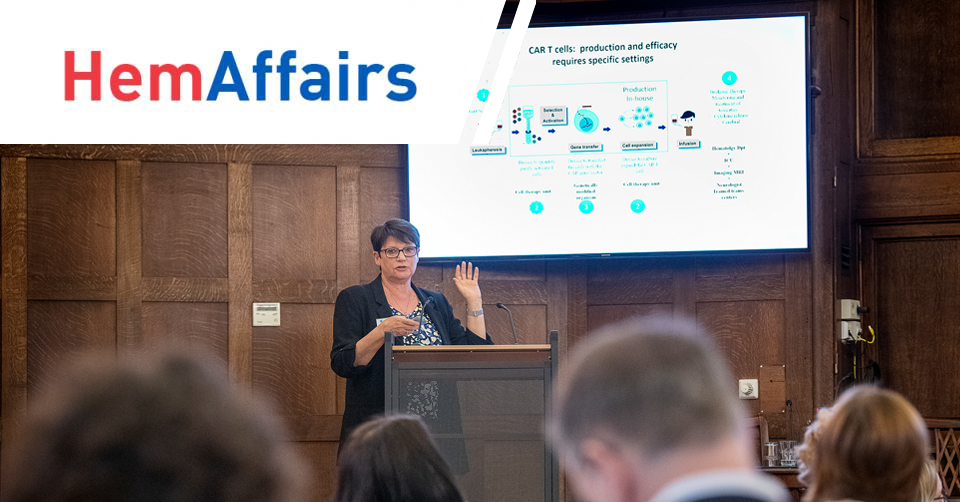This information originally appeared on the previous EHA website. Links to other pages may be inactive.

Prof Christine Chomienne talking about CAR T implementation challenges during the 7th EAPM Presidency Conference in Brussels.
Hematology took center stage at the successful 7th Presidency Conference of the European Alliance for Personalised Medicine (EAPM), entitled ‘Forward as one: Healthcare innovation and the need for policymaker engagement’. More than 100 participants; policymakers, members of the European Commission and the European Parliament, patients, researchers and others, gathered in Brussels on April 8 and 9, 2019, to address the role of the European Union in advancing personalized medicine (see the conference report).
EHA hosted a panel discussion on CAR T cell therapy, one of hematology’s innovative and remarkable contributions to personalizing treatment. Our speakers wholeheartedly called for action and support from the European Commission and Member States in support of this issue.
Patient-centric treatments such as gene and cell therapies have been a game-changer in tackling hematological disorders. Nonetheless, their development remains slow and erratic, limiting benefit for patients. Professor Christine Chomienne, R&I Director of the French National Cancer Institute, Dr Michael Zaiac, Head of Medical Affairs at Novartis, and Professor Jorge Sierra, hematologist from Hospital de la Santa Creu i Sant Pau in Barcelona, composed the first EHA panel dedicated to CAR T, the innovative cellular therapy which had been introduced during the previous session by another EHA expert, Professor Michael Hudecek from the University of Würzburg. They strongly called on policymakers to support the rolling out of CAR T and other cellular therapies across Europe to maximize the benefit of hematology-driven innovation for European patients. The European Union (EU) has a key role to play, beyond funding research, to facilitate the uptake of and access to personalized medicine.
Personalized medicine: where are we?
Personalized medicine has experienced a boost in the past decade as it brings new hope for effectively treating life-threatening diseases. Hematology has been significantly contributing to that trend, through advances in CAR T cell therapy for malignant blood disorders. Chairing the EHA panel, Professor Chomienne stressed undeniable progress: 439 clinical trials involving CAR T technology are ongoing worldwide.
However, in Europe, the picture could be brighter. Despite the EU’s commitment to creating a favorable environment for advanced therapies[1], personalized medicine remains out of reach for most European patients. More than 85% of the above-mentioned trials are taking place in the United States and China, and less than 5% of biotechnology companies are based in Europe. Adding to this, few pre-clinical cases reach the stages of clinical trials and market access. Europe is lagging behind.
The slow uptake of personalized medicine such as CAR T cell therapy stems from persistent hurdles: supply chain challenges, lack of harmonized processes for clinical trials and for approvals, high manufacturing costs, and lack of adequate reimbursement policies. EU policymakers can help the medical community tackle those obstacles.
Need for EU-wide collaboration and harmonization
The next EU Framework Program for Research & Innovation (2021-2027) will be a first step in the right direction. Horizon Europe will allocate funds to gene and cell therapy as a priority for R&I in health. Such recognition is crucial to encourage better translation of innovation into healthcare practices. But it is not enough.
To ensure that CAR T cell therapy becomes available to patients across Europe, EU-wide collaboration and guidance is needed in areas such as certification, training, communication, referrals and long-term follow-up. Active support from Member States and the European Commission is essential. The EU can help in a number of ways:
- By removing or preventing bureaucratic obstacles to the development and uptake of CAR T cell therapy. Rather than being regulated at the national or even regional level, CAR T manufacturing, clinical trials and market access require a harmonized, consistent approval process across Europe.
- By encouraging the endorsement and adoption of EHA guidelines, currently under development, at the national level. There is a strong need for harmonized certification procedures for CAR T centers and technologies, as well as for standardized measurement of outcomes. EU and national regulators should be encouraged to consult EHA experts on the development and implementation of guidelines.
- By supporting a harmonized curriculum. To optimize and ensure the same level of patient care across the EU, EHA is developing a harmonized curriculum with recommendations on minimum levels of competence and knowledge required for healthcare professionals (doctors, specialty and assistant nurses, IC staff, etc.) involved in administering CAR T cell therapy. The use of such tools by pharmaceutical companies as the basis for training programs – under current regulation on personnel qualifications – should be actively supported by the EU.
- By promoting access and affordability, e.g. by facilitating independent academic trials and by achieving a better balance between public and private interests in decisions on market access, pricing and reimbursement. Member States need to step up collaboration on HTA and reimbursement policies; a harmonized framework would help alleviate inequalities in access to personalized medicine.
As MEP Marian Harkin put it, ‘without cross-border collaboration, advanced therapies such as CAR T cell therapy will only be a drop in the ocean’. A functional internal market for personalized medicine would enhance the survival rate and quality of life of patients throughout the European Union. EHA will strive to put that issue on the agenda of the next European Commission and of newly-elected Members of the European Parliament after the EU elections of May 2019.
[1] Regulation (EC) No 1394/2007 on Advanced Therapy Medicinal Products.